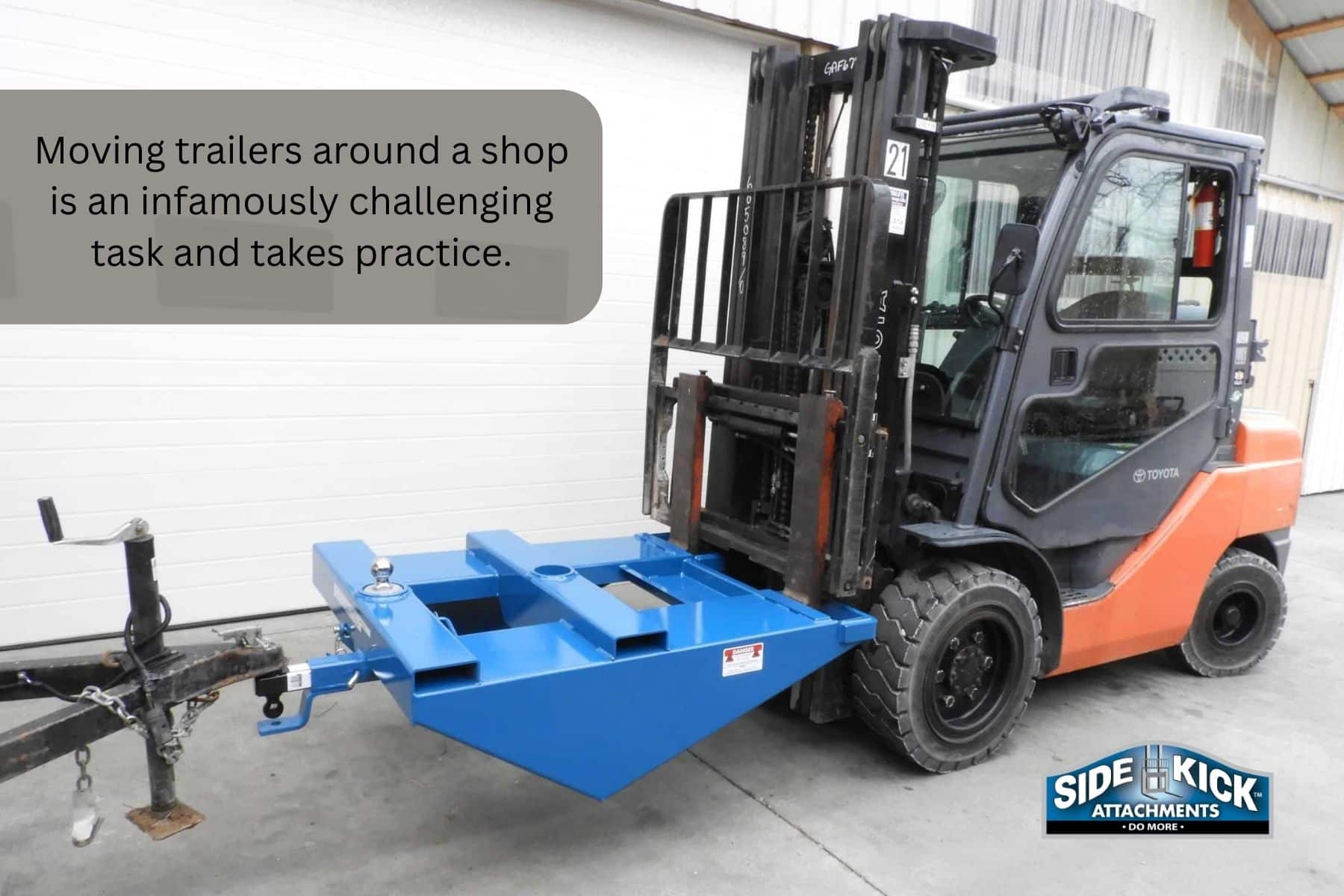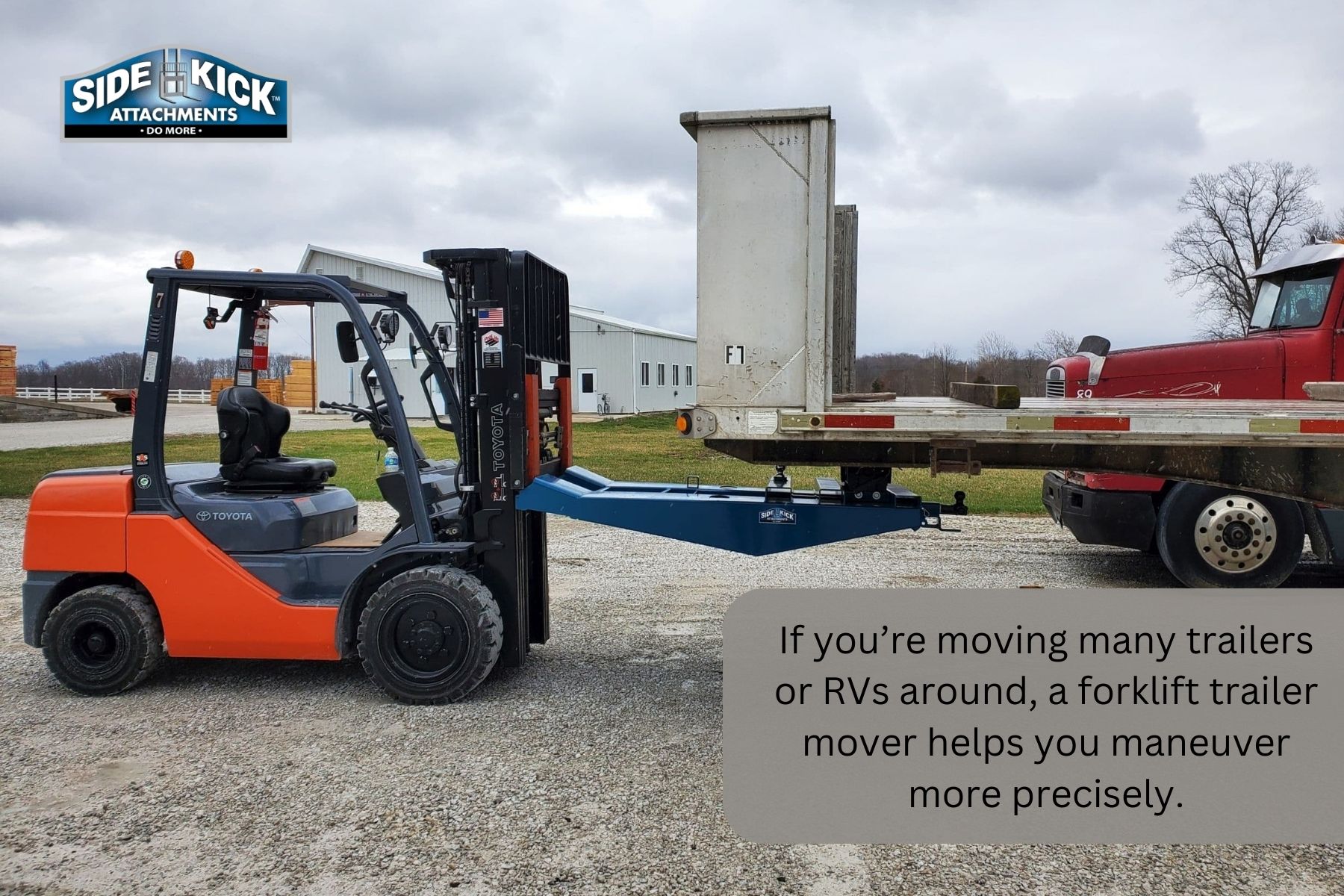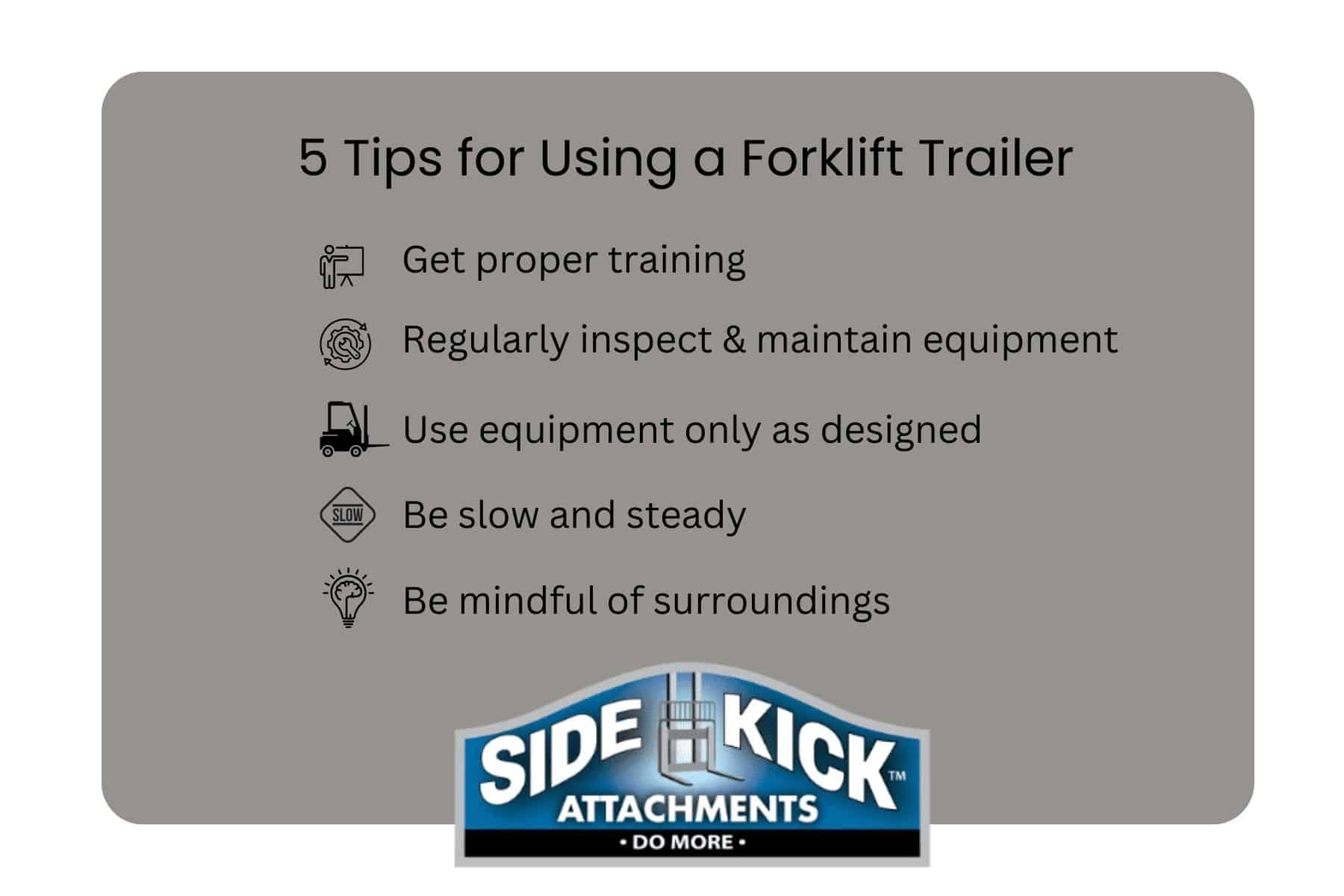5 Essential Safety Tips for Moving Trailers with a Forklift
If you work at a shop or warehouse where you have to move trailers or RVs around, it can be a frustrating experience. Every time you want to move a trailer, you need to find a truck to move it with, and it’s often parked in some inconvenient location. Not to mention that maneuvering trailers into tight spaces can be difficult.
Wouldn’t it be so much handier if there was a way to move the trailer safely with your forklift? You may be tempted to jerry-rig a solution, which is typically unsafe and can damage your forklift.
But don’t worry. Our team at Sidekick Attachments, determined to fix this problem, designed an OSHA-compliant forklift trailer mover to help you move trailers quickly and efficiently with your shop forklift.
Of course, safety matters! Keep reading to learn how to use a forklift trailer mover safely and effectively while saving yourself time and energy on the job.
Why Moving Trailers is a Time-consuming, Sometimes Dangerous Job
Moving a trailer is a notoriously challenging task.
First, trailers limit your visibility, and the larger they are, the worse this problem becomes. They’re also challenging to maneuver, especially if you’re inexperienced. In particular, backing a trailer takes a lot of practice, and the more precisely you have to maneuver, the more difficult it is to get it right.
This is particularly concerning in a shop or warehouse, where moving a trailer poses numerous safety hazards. An inexperienced or careless driver could back a trailer into merchandise, another trailer, a wall or support pillar, or, worst of all—a person!
Another frustration with moving trailers around a shop is that you typically need a truck to move them. Forklifts take care of most of the moving tasks around a shop or warehouse, and while there may be a truck on the premises, it may feel frustrating to have to go find it every time you need to move a trailer.
Overall, moving trailers around a shop takes practice and has the potential to be a dangerous or frustrating experience.

How a Forklift Trailer Mover Can Make You Way More Efficient
Have you ever wished you could simply move a trailer with your forklift?
After all, forklifts are designed to maneuver in small spaces and are readily available in your shop. While moving a trailer with a forklift has the same potential safety risks as moving it with a truck, your employees may be more used to running forklifts than backing trailers with trucks.
Better yet, a forklift is often much handier to grab for a quick job than a truck is. Even if it only takes a few minutes to get a truck, those few minutes really add up in both time and frustration.
Some companies attempt to jerry-rig a solution by welding something together themselves, but these solutions may be unsafe, unsteady, and complicated to use.
Seeing a need for a real fix to the problem, the team at Sidekick Attachments set out to create a forklift trailer mover that’s safe, durable, easy to use, equally balanced on both forks and optimized for trailer control.
We developed our forklift trailer mover to be a hands-free attachment with no extra pins or forks. It’s a quick and easy process every time, with no need to get off the forklift!
But you may be wondering—how much time does a forklift trailer mover actually save? If it only takes a few minutes longer to go get a truck, is it worth buying a forklift trailer mover just for a slightly more convenient experience?
We were just as curious about this as you probably are, so we tracked the data and discovered that the numbers do really add up over time. A few saved minutes here and there added up to an hour and a half of labor saved each week, which meant that over the course of a year, the trailer mover more than paid for itself in saved labor costs. What we couldn't put a price on was the ease of mind and satisfaction from moving the trailer safely and properly.
Finally, forklifts are designed to maneuver into tight spaces in a way that trucks simply aren’t. If you’re moving many trailers or RVs around, you may find that a forklift trailer mover helps you maneuver more precisely.
Bonus: Click here to read more benefits of a forklift trailer mover

Potential Pitfalls of a Forklift Trailer Mover
Of course, in addition to its many advantages, there are some pitfalls associated with using a forklift to move trailers. These include:
Safety Concerns
Operating a forklift can be tricky, especially when using it for purposes it wasn’t designed for, like moving a trailer. Ensure that the person using the forklift trailer mover is trained and experienced in using a forklift and takes proper precautions while learning to move trailers.
Damage to trailer or forklift
Since forklifts are not designed to move trailers, there’s always a danger of damaging the trailer or forklift if you’re not cautious. Always ensure that the forklift trailer mover is designed to be compatible with the type and weight of the trailer as well as the power capacity of the forklift.
Legal issues
Before purchasing a forklift trailer mover, make sure it’s compliant with OSHA standards so you don’t have costly legal issues to deal with down the line.
5 Tips for Using a Forklift Trailer Mover Safely
You want to keep your workplace safe and your workers healthy, so understandably, you may be cautious about something like a forklift trailer mover. But with proper precautions and training, the process will be smooth and safe. Here are five tips to ensure safety while using a forklift trailer mover.
1 - Training
Before asking your employees to move a trailer with a forklift, ensure they’re thoroughly trained on how to operate a forklift and have a decent amount of experience. Then, take the time to train them how to use the trailer mover. Remember—you may feel silly reiterating things the operator probably already knows, but never make assumptions about what they do know. It’s always better to over-train than under-train!
2 - Regularly inspect and maintain equipment
Many safety issues result from faulty equipment, so be sure to inspect your forklifts regularly for signs of damage or mechanical issues and perform regular maintenance.
3 - Use equipment as designed
If your trailers or forklifts become damaged or cause damage to your shop, it may compromise safety and be costly to repair. That’s why you should only use a forklift trailer mover designed to be compatible with your forklift and trailer, and stay within recommended weight limits.
4 - Be slow and steady
Most major accidents could be avoided with a little more caution. Move the trailer at a controlled speed, especially when turning or navigating uneven terrain. Avoid sudden movements or jerky actions that could destabilize the forklift or trailer.
5 - Be Mindful of Surroundings
Pay close attention to your surroundings, including other workers, pedestrians, obstacles, and overhead clearances. If you can’t see well, such as around blind corners, use a spotter to help you.

How Sidekick Attachments Can Help
At Sidekick Attachments, we believe every small manufacturing business, RV plant, warehouse, or shop deserves an efficient, fast, and safe way to move trailers and RV’s with their forklift.
We know it can be frustrating if you don’t have the proper attachment or equipment to safely move trailers at your shop. That’s why we designed a safe and efficient forklift trailer mover that can even be custom-built to suit your particular needs!
No need to worry about damaged or bent forks, wasted time, or unbalanced loads. With our extensive forklift and manufacturing experience, 15-day satisfaction guarantee, and 90-day warranty, you can rest assured that you’re getting the safest and best forklift trailer mover hitch around!
Besides our trailer movers, we also offer other forklift-related equipment, such as:
- Fork Extensions
- Pallet Forks
- Forklift parts & accessories
Get a free quote or contact us today with any questions—we can’t wait to hear from you!




